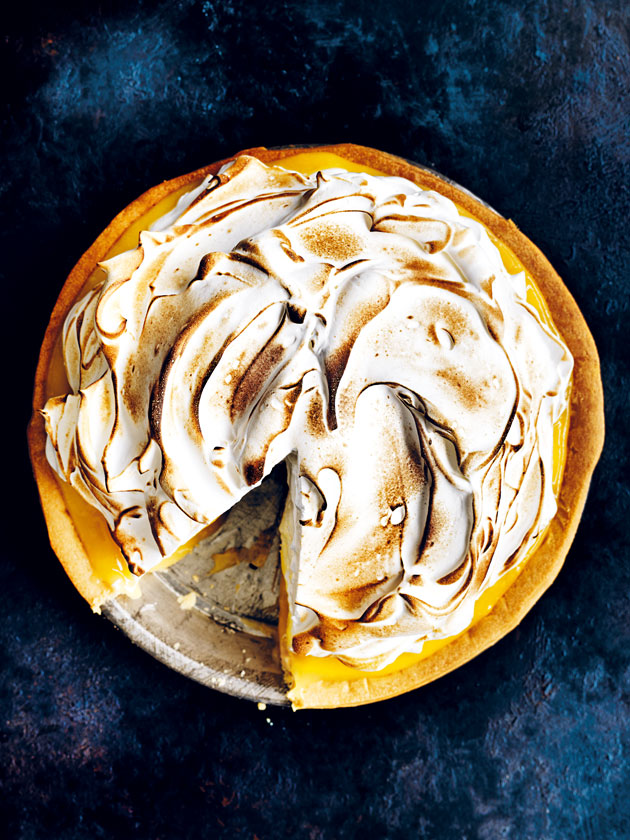classic lemon meringue pie

sweet shortcrust pastry
- 2 cups (300g) plain (all-purpose) flour
- 175g cold unsalted butter, chopped
- ¼ cup (40g) sifted icing (confectioner’s) sugar
- 1 egg yolk
- 2 tablespoons iced water
lemon curd
- 2 eggs
- 2 egg yolks, extra
- 1 cup (220g) caster (superfine) sugar
- 1 tablespoon finely grated lemon rind
- ½ cup (125ml) lemon juice
- 150g cold unsalted butter, chopped into 2cm cubes
meringue mixture
- 225ml eggwhite (about 6 eggs)+
- 1½ cups (330g) caster (superfine) sugar
- 1 tablespoon cornflour (cornstarch)
- 1½ teaspoons white vinegar
- To make the pastry, place the flour, butter and sugar in a food processor and pulse until the mixture resembles fine breadcrumbs. With the motor running, add the egg yolk and water and process until a dough just comes together. Turn out onto a lightly floured surface, gently bring together to form a ball and flatten into a disc shape. Roll out between sheets of non-stick baking paper to 3mm thick and refrigerate for 1 hour.
- Allow the pastry to stand at room temperature for 5 minutes or until workable. Use the pastry to line a lightly greased 22cm pie or tart tin. Trim the edges and prick the base with a fork. Refrigerate for 30 minutes.
- Preheat oven to 180°C (350°F). Line the pastry case with non-stick baking paper and fill with baking weights or rice. Bake for 15 minutes, remove the paper and weights and bake for a further 15 minutes or until the pastry is golden and cooked through. Allow to cool in the tin.
- To make the lemon curd, place the eggs, extra yolks, sugar, lemon rind and lemon juice in a medium bowl and whisk to combine. Transfer the mixture to a large saucepan over medium heat and cook, stirring, for 2 minutes or until the sugar has dissolved.
- Reduce the heat to low and add the butter, 3 pieces at a time, stirring continuously until melted. Cook, stirring constantly, for a further 4–6 minutes or until the curd has thickened and coats the back of a spoon.
- Immediately strain into a heatproof bowl, discarding any solids. Allow to cool slightly and cover with plastic wrap. Refrigerate for 1 hour or until chilled.
- To make the meringue mixture, place the eggwhite in the bowl of an electric mixer and whisk on high speed until soft peaks form.
- Add the sugar, 1 tablespoon at a time, whisking until each addition is dissolved before adding more++. Once all the sugar has been added, scrape down the sides of the bowl and whisk for a further 10–15 minutes or until the mixture is thick and glossy+++.
- Place the cornflour and vinegar in a small bowl and mix until smooth. Add the cornflour mixture to the eggwhite mixture and whisk for 30 seconds or until well combined.
- To assemble, preheat oven grill (broiler) to high. Place the pastry case in tin on an oven tray. Pour the lemon curd into the pastry case and smooth the top, using a palette knife. Spoon the meringue mixture over the lemon curd and grill for 2–3 minutes or until the peaks of the meringue are golden brown.
- Alternatively use a small hand-held kitchen blowtorch to brown the meringue. Allow to cool, place the pie on a cake stand or plate and slice to serve. Serves 8
+ Making meringue is a science. Be sure to measure your ingredients carefully, including the eggwhites as egg sizes do vary. Fresh, room temperature eggs work best – when whisked they’ll become fluffy and voluminous, plus they’re more stable during baking.
++ Be patient when gradually adding the sugar to the eggwhite. Each tablespoon of sugar should be dissolved before the next is added.
+++ Take care not to overwhisk the meringue mixture – it’s ready when it’s thick, glossy, smooth and there are no more sugar granules. You can check this by rubbing a little mixture between your thumb and forefinger.
TIPS
+ By constantly stirring the lemon curd mixture, you’ll end up with luscious, velvety smooth curd.
+ Store lemon curd in an airtight container or jar in the refrigerator for up to 1 week.
+ It’s best to avoid making meringue on humid days. Excess humidity can cause meringue to sink during or after baking.
Photography: William Meppem






